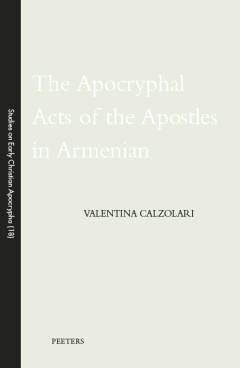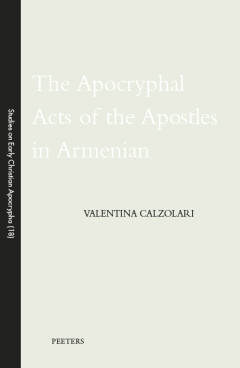
- Afhalen na 1 uur in een winkel met voorraad
- Gratis thuislevering in België vanaf € 30
- Ruim aanbod met 7 miljoen producten
- Afhalen na 1 uur in een winkel met voorraad
- Gratis thuislevering in België vanaf € 30
- Ruim aanbod met 7 miljoen producten
Zoeken
Omschrijving
After an overview of the Christian Apocrypha in Armenian, the volume starts with three essays dealing with the apostles of Armenia, Thaddaeus and Bartholomew. The cycle of Thaddaeus merges with the traditions related to Addai, King Abgar, and the old Christianity of Edessa, while the account of the discovery of the relics of Bartholomew in Armenia is connected with the bishop Marutha of Maypherkat. The second part of the volume includes four essays on Thecla and on the different paradigms of holiness (virgin, martyr, preacher, and patroness of Nicaean orthodoxy) that she embodies in the ancient Armenian historiographical literature. The last two chapters are devoted to the Armenian translations of the Martyrdom of Andrew and the Martyrdom of Philip, which contain some Encratite passages absent from the Greek. All these essays stress the importance of the apocryphal writings as evidence for a better understanding of ancient Christianity in Armenia in its different facets and in its relations with the neighbouring Christian communities.
Specificaties
Betrokkenen
- Auteur(s):
- Uitgeverij:
Inhoud
- Aantal bladzijden:
- 300
- Taal:
- Engels
- Reeks:
- Reeksnummer:
- nr. 18
Eigenschappen
- Productcode (EAN):
- 9789042946217
- Verschijningsdatum:
- 1/06/2022
- Uitvoering:
- Paperback
- Formaat:
- Trade paperback (VS)
- Afmetingen:
- 150 mm x 230 mm
- Gewicht:
- 1945 g

Alleen bij Standaard Boekhandel
+ 200 punten op je klantenkaart van Standaard Boekhandel
Beoordelingen
We publiceren alleen reviews die voldoen aan de voorwaarden voor reviews. Bekijk onze voorwaarden voor reviews.











